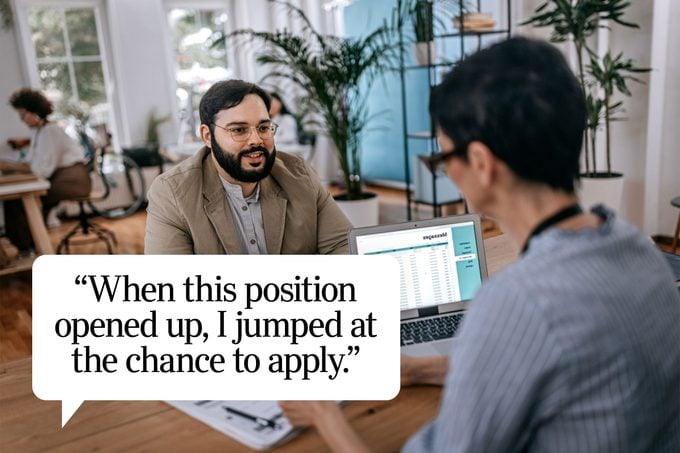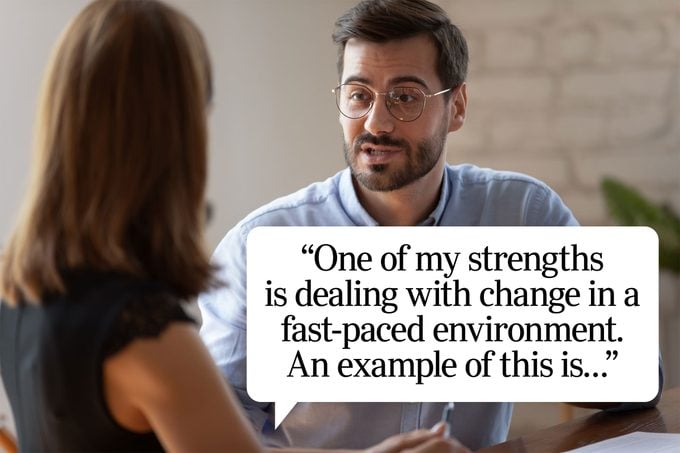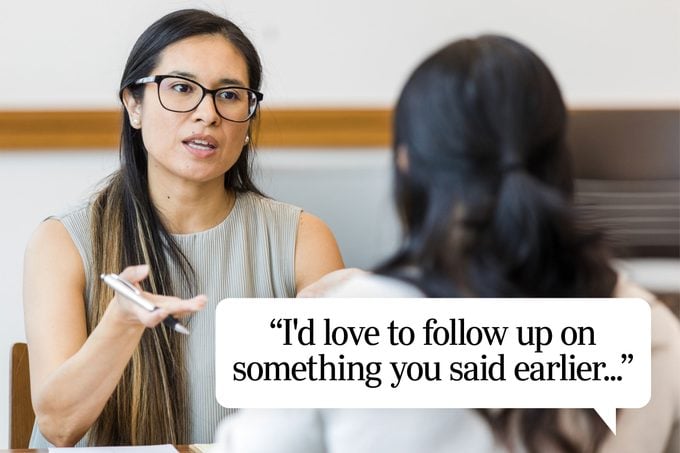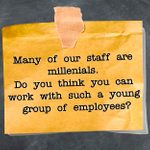17 Things to Say in an Interview to Land the Job, According to Hiring Managers

This is your chance to show them that you're the ideal candidate. Here's what to say in an interview if you want to land your next job.
Curating your resume, writing a cover letter, drafting a LinkedIn profile free of misspellings and passing the preliminary screening—you’ve jumped through all the job-application hoops, and you’ve made it to the interview. First, take a deep breath and congratulate yourself; it’s a compliment to your skills that they want to interview you. And then prepare. You’ll want to know exactly what to say in an interview before you ever step through the door.
“I’ve interviewed hundreds of people over the years, and I can tell you that the thing that sets apart a great candidate from a good candidate is preparation,” says Cynthia Banks, a professor of business at the University of Colorado–Boulder who was the CEO of a global education company for more than 20 years. “The interview is not something you want to wing.”
To help you prepare for this important moment, we talked to experts to get you the lowdown on what to say in an interview (and want to avoid saying). If you’re not getting hired, your grasp of business etiquette and digital etiquette may need some fine-tuning. Keep reading to learn top-notch job-interview etiquette advice from the people doing the hiring.
Get Reader’s Digest’s Read Up newsletter for etiquette tips, humor, cleaning, travel, tech and fun facts all week long.
What to say at the beginning of an interview
The wait is over. The hiring manager has invited you into the office, and now it’s time to wow ’em. (And, you know, not sweat through your shirt.) Here’s what to say in an interview that’s just begun.
“It’s so nice to meet you! I’ve really been looking forward to this interview. It’s a beautiful day, isn’t it?”
Small talk and pleasantries are expected in business settings, so you need to know how to introduce yourself in an interview. Practice saying your introduction while offering a firm handshake, Banks says.
“Be upbeat and calm,” she says. “But don’t stress about it too much. We know people get nervous doing interviews, and most interviewers will be accommodating.”
This is a little more awkward when your interview is on Zoom, and you should practice with your equipment before your interview so you don’t spend your opening minutes asking if the other person can hear you or worrying about the lighting, she adds.
“When this position opened up, I jumped at the chance to apply. I have a background in X, and I know the company is doing exciting things moving that field forward.”
If your interviewer asks why you are interested in working for their company or how you heard about the job, you should have your “elevator pitch” ready and practiced, says Dave Johnson, a hiring manager with 12 years of experience in a wide variety of industries, including tech, health care, telecommunications and the service industry.
“When you’re job searching, this pitch is a tool you should always have in your pocket. You should highlight a bit of your relevant career experience and how that led you to apply for this position,” he explains. “This is a good time to frame yourself as the ideal candidate.”
He adds that you should keep your answers relatively short, between 30 seconds and a minute.
“I’ve admired this company for X, and I feel like my skills in Y will be a great fit for your current projects.”
Another popular early interview question is asking what interests you about the specific role you are applying for. Your answer to this question shows that you’ve done your research and thought about how your skills match the company’s needs, Johnson says.
“I like to hear why they are excited about the position, and I also like to get a high-level understanding of their experience to jog my memory about them or their resume before I start asking more questions,” he says.
Again, keep it brief—between 30 seconds and a minute. Talking too long is one of the bad work habits you should avoid.
“I’ve lived in New York for five years, I have two dogs and I am taking a night class to become a pastry chef because I love baking.”
“Tell me a little bit about yourself” is the standard icebreaker in interviews, and how you answer it can set the tone for the rest of the meeting, so it’s a good idea to prepare a response. (The “tell me about yourself” example answer above is a good template.)
“Tell me three things about yourself that are a little personal but not oversharing, and keep it under two to three minutes,” Banks says. She advises making your things relatable (like those having to do with food, travel, hobbies and pets) but not controversial (avoid religion and politics). At least one of those things should be memorable. “This helps me get to know you as a person.”
Under no circumstances should you read them your resume, she adds. Instead, assume the interviewer has read your resume, then work in your credentials and expertise throughout the interview. (Psst! Make sure you’re avoiding these common resume mistakes.)
“I love running and am training for a marathon. It’s been good for my physical endurance but also helps me practice my mental endurance and focus—something that I bring to my job as well. Hopefully, the job will give me fewer blisters!”
Another way to answer the “tell me about yourself” question is to take one of your personal facts and relate it to the job or the company in a positive way, says Rebecca Metts, the director of people at an aerospace company and a people-operations management consultant with more than 10 years of experience.
“I like it when people point out how their personality meshes with the role,” she says. “Keeping it lighthearted and adding a little appropriate humor will make you memorable.”
She adds that the interview is never the time to share a difficult life struggle, like a health or family crisis. Nor is it the time to disclose things about you that might negatively affect your ability to work, like a pregnancy or a chronic illness. If the interviewer asks you to share a time you struggled with something difficult, pick a fairly bland, work-related example, not a personal one, she adds. For instance, you might say, “When the client moved up the deadline by a month, I was really stressed out and wasn’t sure if we’d be able to do it. But I overcame that by …”
What to say in the middle of an interview
The discussion is heating up, and the hiring manager is moving beyond small talk into the nitty-gritty details of your past jobs and your work abilities. Here’s what to say in a job interview to impress the hiring manager.
“I learned a lot working at X company, but I’ve been looking for more opportunities to grow, and I’m excited to learn more about the field here at Y company.”
Asking why you left your last job is a pretty standard interview question—but the interviewer isn’t looking for what your reason was as much as how you share it, Banks says. “Keep your answer vague and positive,” she says. “Resist the urge to criticize your previous employer. Even if it’s all true, it shows that you’re willing to trash talk others, and that says something about your character and work ethic.”
There’s a time and a place to complain politely, but your interview is not it. Instead of rehashing the past, she suggests keeping the conversation focused on your interest in this new opportunity or on what you hope to achieve if you’re changing careers.
“I have three years of experience with X software and have a portfolio I can show you to attest to my skills. I have only one year of experience with Y software, but that’s something I’ve always wanted to learn more about.”
There’s a fine line between underselling and exaggerating your skill set, but that’s the line you want to walk, Banks says. She adds that in her experience, women are more likely to undersell themselves, while men are more likely to exaggerate.
“You want to be humble and show that you’re teachable but also be confident,” she says. “Stand behind what you do know and emphasize that while also being honest about what you don’t.”
In the meantime, you can also do a little career cushioning by learning new skills that make you more marketable.
“One of my strengths is dealing with change in a fast-paced environment. An example of this is …”
Interviewers love to ask open-ended questions, but even if the question isn’t ideal—perhaps they ask you “Do you do well with change?”—you should answer the question that’s asked and offer a little bit more detail, Banks says. There are lots of potential things to say in an interview, but the hiring manger wants more than one-word answers.
So don’t just answer “yes” or “no” to the above question; instead, answer and then elaborate on an example that shows, not just tells about, your expertise.
“Did I answer your question?”
Interview questions can get pretty involved and technical. For these in-depth questions, you want to make sure you’re answering the question completely and giving them all the info they need. One way to check is to simply ask them at the end of your answer.
“I really appreciate it when an applicant is self-aware and asks, ‘Did I answer your question?'” Johnson says. “Of course, don’t do this on every answer, but if you sense they aren’t following, it’s a good way to give the hiring manager a chance for clarity. This shows me they can read body language and are self and socially aware.”
“Your company is an industry leader in X. What’s the next move or the goal you’re working toward?”
It’s not just the interviewer who should be asking the questions! This interview is just as much about you getting to know the company, Banks says. Far from an etiquette mistake, asking questions of the hiring manager is actually a good thing.
“Businesspeople usually love talking about their company and will welcome the chance to share their vision with you,” she says. “I also love when people ask specific questions about the company because it shows that they’ve done their research and are truly interested in what we do.”
“I see that you value X. That’s also really important to me, as shown by …”
“Companies often put their values and mission statement on their website, and it’s not just throwaway jargon. They mean something,” Metts says. “Being able to say those back to the interviewer, and [articulate] how you share those values, shows that you did your research and that you’re a team player.”
This gives you a good opening to promote some of the qualities or skills that make you a great fit for the job, she adds. Reading up on a company before the interview is one of the top job-hunting tips from experts, and it’s a good way to avoid common job-hunting mistakes.
“I completed the pre-interview homework. Did you have any questions about my work?”
In this day and age, it’s quite common for companies to ask you to do some sort of homework. It can feel like a burden or just another hoop to jump through, but companies see it as an opportunity for you to show them a lot without taking up a lot of their time, Johnson says.
“People who complete the homework are showing they are motivated to get the job and are hard-working,” he says. “If you decline the homework, you likely will be declining the job, but you need to do what’s right for you.”
He adds that it’s important that, if you’re submitting work or a portfolio outside the interview, you make sure it shows all your own work.
What to say at the end of an interview
You’re almost done! The conversation is winding to a close. Here’s what to say in an interview to wrap up with a bang.
“I’d love to follow up on something you said earlier. May I ask a question about X?”
The end of the interview is your time to ask for any clarifications, Johnson says. In fact, not asking any questions is one of those so-called polite habits that job interviewers actually dislike.
“I expect candidates to ask me at least a couple of questions at the end of the interview,” he says. “I like the questions more when they are based on things we’ve talked about because it shows they are listening.”
“I really enjoyed speaking with you about X!”
Interviewers are people too, and they appreciate positive feedback. “As long as you are speaking the truth, I feel it’s good to let them know you enjoyed the conversation, especially some specific part about the conversation, because that makes the person feel good, and then they may like you more,” Johnson says. “You know, positive psychology!”
In addition to making you more likable, giving a compliment also shows your people skills and your ability to focus and retain information—all talents that are likely critical to the job you’re applying for.
“What’s the next step in the process?”
Sometimes the interviewer will volunteer what you should expect to happen next, but if they don’t, it is OK to ask, especially if that was not clearly laid out at the beginning of the interview process, Johnson says. “I would not ask for specific timelines, as it can make the interviewer feel pressured,” he adds.
“I love what I’ve heard today, and I hope you enjoyed meeting me as well. I’d love to meet again to discuss this further.”
Regardless of how you feel it went, close the interview with a positive statement and an offer to meet again, Banks says. “This keeps the door open for a second interview without you asking for it outright, which can be seen as presumptuous,” she says.
“I’d love to learn more about working for this company and how I can contribute.”
The end of the interview is not the time to bring up salary, benefits or vacation time—all of those should be left until the negotiating phase, Johnson says. (Speaking of money, there are certain things you shouldn’t say when asking for a raise either.)
By broaching those topics too early, you risk jumping the gun or making it seem like you care more about the compensation than the job. Of course, the compensation is a huge part of why you’re interested in the job (after all, we work to pay the bills), but there will be a time to discuss all that, and the end of the interview isn’t the time, Banks says.
Another reason to let details like salary go for now? In larger companies, the people doing the interviewing may not know that information yet, Johnson says.
About the experts
- Cynthia Banks, MS, is a professor of business at the University of Colorado–Boulder. She was the CEO of a global education company for more than 20 years and now works as a career coach and runs a consulting business.
- Dave Johnson is a hiring manager with 12 years of experience working in a wide variety of industries, including tech, health care, telecom and the service industry.
- Rebecca Metts is the director of people at an aerospace company and a people-operations management consultant with more than 10 years of experience.








